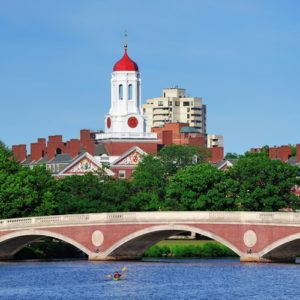 Harvard is taking culinary arts programs to the Ivy League with its fifth season of public lectures regarding science and cooking. The lectures run from September through early December and are headlined by legendary chefs and scientists. The lecture series complements a class at the university simply titled “Science & Cooking: From Haute Cuisine to the Science of Soft Matter.” For culinary students in the Boston area, these lectures are a tremendous opportunity to learn much of the science behind trends in the food industry. The science of fine cuisine is often out of sight and out of mind for those not immersed daily in the kitchen, and even for chefs of all skill levels and backgrounds, sometimes the chemistry of cooking is overlooked. Harvard’s public lecture series is a seasonal opportunity to take your knowledge of culinary science to the next level.
Harvard is taking culinary arts programs to the Ivy League with its fifth season of public lectures regarding science and cooking. The lectures run from September through early December and are headlined by legendary chefs and scientists. The lecture series complements a class at the university simply titled “Science & Cooking: From Haute Cuisine to the Science of Soft Matter.” For culinary students in the Boston area, these lectures are a tremendous opportunity to learn much of the science behind trends in the food industry. The science of fine cuisine is often out of sight and out of mind for those not immersed daily in the kitchen, and even for chefs of all skill levels and backgrounds, sometimes the chemistry of cooking is overlooked. Harvard’s public lecture series is a seasonal opportunity to take your knowledge of culinary science to the next level.
Lecture structure and upcoming discussions
A faculty member from Harvard will speak for 15 minutes at the beginning of every lecture to provide background knowledge necessary to the chef’s subject matter. The seating is first come first serve and, according to Boston Eater, in the past attendees have lined up hours in advance to get a good seat. The one exception to this seating system will be the lecture on Oct. 20, in which Ferran Adrià will be speaking. Tickets will be made available in advance at the Harvard Box Office beginning Oct. 14. The science and cooking college course is limited to Harvard undergraduates.
It’s no surprise that these talks fill up so quickly considering Harvard has lined up some of the world’s most renowned culinary talent. Visiting lecturers include Mark Ladner, Daniel Humm, Bill Yosses, Dominique Crenn, Jody Adams and Christina Tosi. These chefs will be discussing very specific scientific aspects of their specialties, so while a lecture by Enric Rovira might be especially pertinent to an aspiring chocolatier, a talk by Nathan Myhrvold might be more applicable to a computer developer looking to change careers.
First lecture recap
The series kicked off on Sept. 8 with a lecture titled “Science and Cooking: A Look at the Last Twenty Years” lead by Dave Arnold and Harold McGee. Harvard professor Michael Brenner began the talk with a brief introduction. Arnold and McGee are not unfamiliar to the Harvard lecture series. In fact, the duo were first to speak in 2013 as well. However, their lecture last year had to be evacuated due to a malfunctioning cereal-puffing machine, which set off the smoke alarms.
This year Arnold and McGee discussed the evolving role of science in the art of cooking over the past several decades and speculated about future trends. The two talked about the growing presence of molecular gastronomy in the kitchen, contemplating why many diners seem to be expecting flashier and more elaborate experiences with their food. Arnold is a well-known experimenter in the kitchen, particularly in regard to cocktails, and McGee is in many ways one of the godfathers of the molecular gastronomic movement, having long emphasized the importance of understanding science as a tool in the culinary process. The duo often tests out simple culinary hypotheses to better understand the science behind ancient and contemporary cooking methods.
Arnold and McGee covered several of these past hypotheses in their lecture. They examined everything from the best temperature for cooking mushrooms to chef Wylie Dufresne’s ability to make noodles completely out of shrimp. The duo also discussed an experiment conducted with Momofuku chef David Chang testing out the best way to kill fish to keep it fresh.
All lectures take place in the Harvard Science Center on Mondays.

